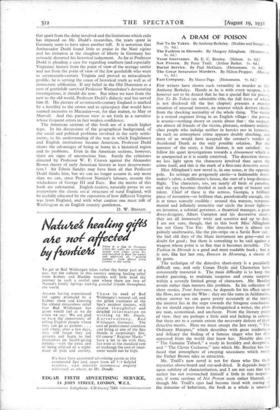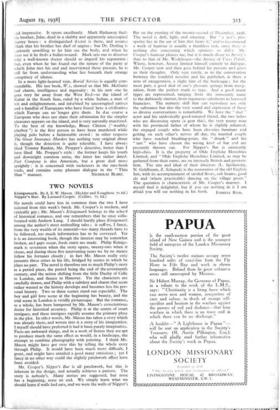A DRAM OF POISON -
Not To Be Taken. By Anthony Berkeley. (Hodder and Stoughtt.a. 7s. 6d.) The Fashion in Shrouds. By Margery Allingham. (Heinemaaa. 8s. 6d.) Trent Intervenes. By E. C. Bentley. (Nelson. 78. 6d.) Not Proven. By Peter Trail. (Arthur Barker. 7s. 6d.) Burial Service. By Paul McGuire. (Heinemann. 7s. 6d.) The Great Insurance Murders. By Milton Propper. (Harrap. 7s. 6d.) Fast Company. By Marco Page. (Heinemann. 7s. 6d.)
FEW writers have shown such versatility in murder as Mr. Anthony Berkeley. Handy as he is with every weapon, it is however not to be denied that he has a special flair for poisor. Not To Be Taken (an admirable title, the full force of which
is not disclosed till the last chapter) presents a murder situation of unusual interest, an interest which derives chiefly from the shocking normality of the whole thing. The victim is a retired engineer living in an English village : the poison is arsenic—nothing showy or exotic about that : the suspects are almost all friends of the victim, pleasant; ordinary middle-
class people who indulge neither in heroics nor in hysterics. In such an atmosphere crime appears doubly shocking, and most of. us would have accepted the coroner's verdict of
Accidental Death as the only possible solution. But the narrator of the story, a fruit farmer, is not satisfied : we
follow his quiet investigations towards a denouement which is as unexpected as it is neatly contrived. The detection throws no less light .upon the characters involved than upon the
crime itself, and this is the mark of a first-rate detective novel.
Miss Allingham's new novel is, in one sense, at the opposite pole. Its settings are gorgeously exotic—a fashionable dress- maker's salon, a millionaire's house, the start of a long-distance flight. The characters, too, are nearly all birds of paradise, and the eye becomes dazzled at such an array of beauty and talent. Chief of these is the actress, Georgia, a brilliant piece of invention—so brilliant that, paradoxically!enough, she is at times scarcely credible : around this wanton, tempera- mental and infinitely attractive star circle the lesser lights— an inventor, a colonial governor, a theatrical manager, a great dress-designer, Albert Campion and his decoratiVe sister; they are all immensely witty and sensitive and up to date. I am not sure, though, that in this book Miss' Alllrigham
has not Gone Too Far. Her detection here is. t too politely unobtrusive, like the pin-stripe on a Savile Rthir suit : the bad old days of the blunt instrument are goneand no 'doubt for good ; but there is something to be said against a Weapon whose point is so fine that it becomes invisible.' The Fashion in Shrouds is a good and most readable book ; but it is not, like her last one, Dancers in Mourning, a classic of
its genre.
The technique of the detective short-story is a peculiarly difficult one, and only Conan Doyle and CheSterton have consistently mastered it The main difficulty is:to keep the
reader guessing, to maintain.:Suspense and create surprise within a severely limited group of characters. _Mr. Bentley avoids rather than masters this problem. In his Collection of short stories, Trent Intervenes, he depends for his eiteCt upon the How, not upon the Who : they are like sums in Aiithmetic, whose answer we can guess pretty accurately at the start; the interest lies in the steps towards the fOregone conclusion. As we should expect from so distinguished a writer, the plots are neat, economical, and un-fussy. FroM the literary point of view, they are perhaps a little arid and Jacking in 'colour, but these are to a certain extent the necessary defects Of their detective merits. Here we must except the last story, " The Ordinary Hairpins," which describes with great tenderness 'and delicacy the finding of a famous singer who has dis- appeared from the world that knew her. Notable also are " The Genuine Tabard," a study in heraldry and deception, and " The Clever Cockatoo," into which Mr. Bentley has in- fused that atmosphere of creeping uneasiness which made
the Father Brown tales so attractive.
Mr. Train's new novel is not for those who like their mysteries above-board and cut-and-dried. It depends largely
upon subtlety of characterisation, and I am not -sure that the author has not overreached himself a little in this respect : yet, if some sections of Not Proven seem rather blurred, as though Mr. Trail's eyes had become tired with staring at
the minutiae of behaviour, the book as a whole is unusual nd impressive. It opens excellently. Mark Hathaway find ; his brother, John, dead in a shabby and apparently unoccupied Surrey house : a distinguished doctor is there, and assures Mark that his brother has died of angina ; but Dr. Detling is curiously unwilling to let him see the body, and when he does see it he finds a bullet-wound. Mark sets out to discover why a well-known doctor should so imperil his reputation : but, even when he has found out the nature of the party at which John met his end and interviewed those present, he is still far from understanding what lies beneath their strange conspiracy of silence.
In a more light-hearted vein, Burial Service is equally com- mendable. His last book, W.r, showed us that Mr. McGuire had charm, intelligence and ingenuity : in his new one he goes very far away from the West End—to the island of Kaitai in the South Seas, ruled by a white Sultan, a man of wit and enlightenment, and inhabited by uncorrupted natives and a handful of Europeans who have found here a civilisation which Europe can no 'longer give them. In due course a European who does not share their admiration for the simpler pleasures appears on the island, and is very naturally murdered. To the best of my knowledge, Bruce Clinton (" wealthy playboy ") is the first person to have been murdered while playing polo before a fashionable crowd : in other respects The Great Insurance Murders has nothing very original about it, though the detection is quite tolerable. I have always liked Tommy Rankin, Mr. Propper's detective, better than I have liked Mr. Propper's style : the former keeps his youth and downright common sense, the latter has rather dated. Fast Company is also American, but a great deal more sprightly : it is concerned with racketeers in the rare-book trade, and contains some pleasant dialogue in the " Thin







































 Previous page
Previous page